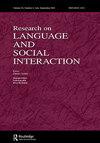引导儿童回应:优先考虑儿童的参与而不是互动进展
IF 2.1
1区 文学
Q1 COMMUNICATION
引用次数: 2
摘要
摘要:当成年人选择年幼的儿童回答问题时,儿童在回答问题时的拖延和麻烦可能会导致儿童参与与通常适用于成年人之间对话的进步偏好之间的紧张关系。根据日常成人-儿童对话数据,本研究重点关注被选中的儿童没有及时或充分回应的问答序列,并考察了共同在场、未被选中的成年人如何在进步性和促进儿童参与的必要性之间取得平衡。分析表明,成年人倾向于通过将儿童参与置于进步之上来管理这种平衡,从而使儿童社交以实现互动自主。这种在成人与儿童互动中的偏好排序与之前在成人对话中的发现形成了对比。这项研究提供了经验证据,证明成年人如何优先考虑儿童参与,并将儿童社会化为积极参与对话。数据为中文和英文。本文章由计算机程序翻译,如有差异,请以英文原文为准。
Guiding Children to Respond: Prioritizing Children’s Participation Over Interaction Progression
ABSTRACT When adults select young children to answer questions, children’s delays and troubles in responding may lead to a tension between child participation and the preference for progressivity that normally applies to conversations among adults. Drawing on everyday adult-child conversational data, this study focuses on question-answer sequences in which the selected child does not respond in a timely or adequate manner and examines how co-present, nonselected adults balance between progressivity and the need to facilitate child participation. The analysis shows that adults tend to manage this balance by prioritizing child participation over progressivity, thereby socializing children to achieve interactional autonomy. This ordering of preferences in adult-child interaction is in contrast with previous findings in adult conversation. This study provides empirical evidence of the ways adults prioritize child participation and socialize children into active responsive participation in conversation. Data are in Mandarin and English.
求助全文
通过发布文献求助,成功后即可免费获取论文全文。
去求助
来源期刊
CiteScore
7.30
自引率
7.40%
发文量
20
期刊介绍:
The journal publishes the highest quality empirical and theoretical research bearing on language as it is used in interaction. Researchers in communication, discourse analysis, conversation analysis, linguistic anthropology and ethnography are likely to be the most active contributors, but we welcome submission of articles from the broad range of interaction researchers. Published papers will normally involve the close analysis of naturally-occurring interaction. The journal is also open to theoretical essays, and to quantitative studies where these are tied closely to the results of naturalistic observation.

 求助内容:
求助内容: 应助结果提醒方式:
应助结果提醒方式:


